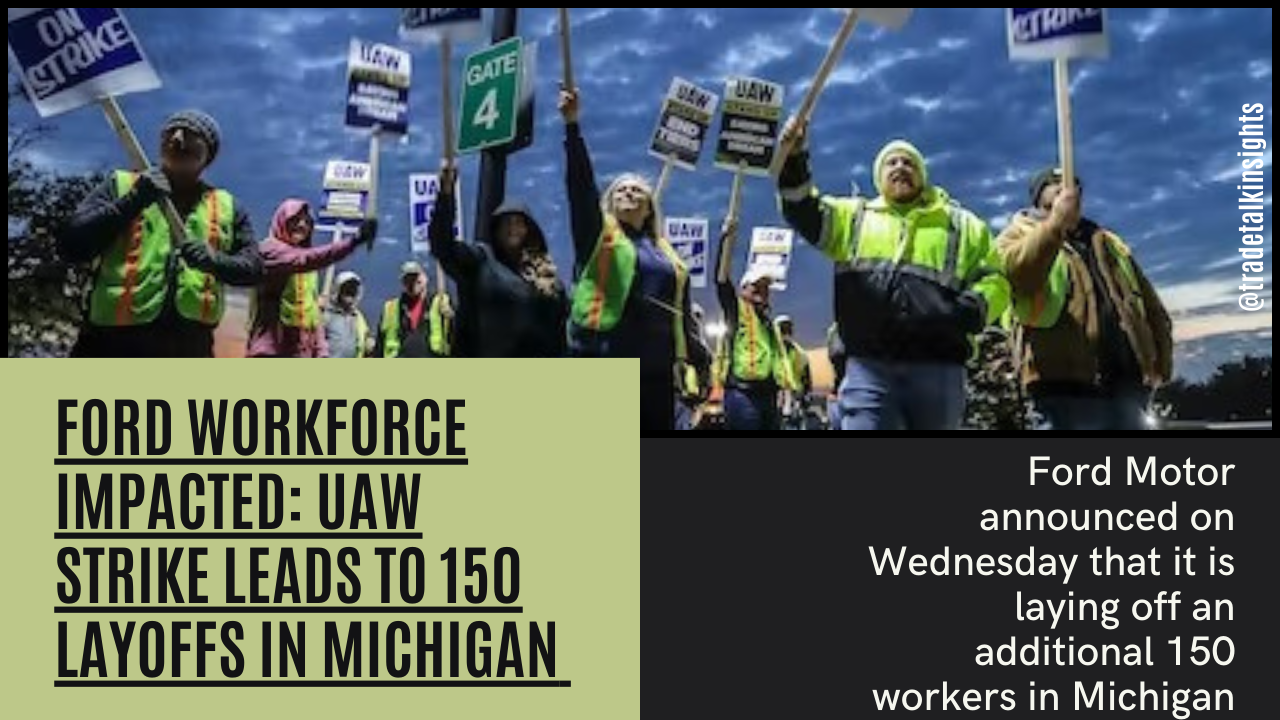
In a significant development for the automotive industry, Ford Motor announced on Wednesday that it is laying off an additional 150 workers in Michigan due to the ongoing United Auto Workers (UAW) strike. This move increases the total number of furloughed workers to a staggering 2,730. The strike, initiated by the UAW last week at the Kentucky Truck Plant, has caused a ripple effect throughout Ford’s operations, leading to these new layoffs at a Michigan axle plant. As the strike enters its second week, it is essential to understand the reasons behind it, its implications, and what the future may hold for both Ford and the UAW.
The UAW strike at Ford, which began at the Kentucky Truck Plant, has now affected multiple facilities, including three assembly plants. The strike involved approximately 16,600 Ford employees, making it one of the most significant labor disputes the company has faced. The epicenter of the strike is the Kentucky Truck Plant, which happens to be Ford’s largest plant worldwide.
Several factors have contributed to the UAW strike at Ford. These include:
Labor Contract Negotiations: At the heart of the strike are unresolved labor contract negotiations. The UAW and Ford have been in discussions over issues like wages, benefits, and working conditions, but a mutually agreeable deal has not been reached.
Job Security: Job security is a major concern for the UAW. The union is seeking assurances from Ford that its members’ jobs will be safeguarded amidst ongoing technological changes and the potential shift towards electric vehicles.
Wage Disparities: Disparities in wages and compensation packages between different categories of Ford workers have also been a contentious issue. The UAW is pushing for more equitable pay structures.
Production Halts: The strike has forced production halts at Ford’s assembly plants, causing a decline in vehicle output. This, in turn, can affect the company’s revenue and market position.
Financial Impact: The ongoing strike is causing financial strain on Ford. The company not only loses revenue from reduced production but also incurs additional costs associated with the strike, including strike pay and idle plant expenses.
Supply Chain Disruptions: The strike disrupts Ford’s supply chain, causing delays and potential shortages of automotive components. This can lead to customer dissatisfaction and damage Ford’s reputation.
Employee Morale: The strike has a direct impact on the morale of Ford’s workforce. Employee dissatisfaction and prolonged strikes can create a challenging work environment, affecting productivity and long-term retention.
The recent decision by Ford to lay off an additional 150 workers at a Michigan axle plant is a direct consequence of the UAW strike. The strike at the Kentucky Truck Plant disrupted the supply chain, affecting the production of essential components, including axles. As a result, the Michigan axle plant faced reduced demand for its products, leading to unfortunate layoffs. This incident highlights the interconnectedness of the automotive industry and the extensive reach of a labor strike’s consequences.
The outcome of the UAW strike and its impact on Ford and the broader automotive industry remains uncertain. Key factors to consider for the future include:
Resolution of Labor Negotiations: The primary concern is the resolution of labor contract negotiations. A fair and equitable agreement could potentially bring an end to the strike and help Ford regain lost ground.
Financial Recovery: Ford will need to assess the financial repercussions of the strike and work on a strategy to recover its losses and maintain profitability.
Supply Chain Stabilization: The restoration of a stable supply chain is essential for Ford to meet customer demand and prevent further disruptions.
Employee Relations: Repairing employee relations and ensuring a motivated and satisfied workforce will be crucial to Ford’s long-term success.
The UAW strike at Ford, which began at the Kentucky Truck Plant, has led to additional layoffs at a Michigan axle plant. The strike’s root causes, including labor contract negotiations, job security, and wage disparities, have significant implications for Ford. The recent layoffs emphasize the far-reaching consequences of such labor disputes within the automotive industry.
As the strike continues, all parties involved must seek a resolution that serves the best interests of the workers, the company, and the industry as a whole. The future holds many uncertainties, but one thing remains clear: a cooperative approach and open dialogue are essential to finding a solution that benefits all stakeholders.
Hope everything will be fine very soon…
I hope Everything will be fine very soon